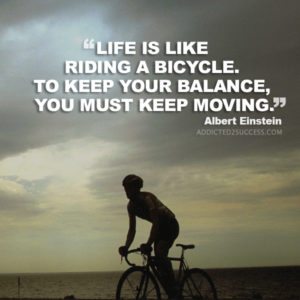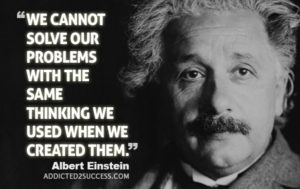Change Your Mindset
80 Albert Einstein Quotes to Inspire You For Life

Albert Einstein is recognized around the world as one of the most iconic and intelligent minds ever. From his fantastic scientific discoveries, to the hardships he endured during his life; Einstein shared a lot of wisdom and insight on life, people, and the world in general
Here are 80 of Albert Einstein‘s most insightful quotes:
1. “The important thing is not to stop questioning. Curiosity has its own reason for existing.”– Albert Einstein
2. “Weakness of attitude becomes weakness of character.” – Albert Einstein
3. “Truth is what stands the test of experience.” – Albert Einstein
4. “Common sense is nothing more than a deposit of prejudices laid down in the mind before you reach eighteen.” – Albert Einstein
5. “The only source of knowledge is experience.” – Albert Einstein
6. “Any man who reads too much and uses his own brain too little falls into lazy habits of thinking.” – Albert Einstein
7. “There comes a time when the mind takes a higher plane of knowledge but can never prove how it got there.” – Albert Einstein
8. “Everybody is a genius. But if you judge a fish by its ability to climb a tree, it will live its whole life believing that it is stupid.” – Albert Einstein
9. “We cannot solve our problems with the same thinking we used when we created them.” – Albert Einstein
10. “Human beings must have action; and they will make it if they cannot find it.” – Albert Einstein
11. “Education is what remains after one has forgotten what one has learned in school.” – Albert Einstein
12. “If A is a success in life, then A equals X plus Y plus Z. Work is X; Y is play, and Z is keeping your mouth shut.” – Albert Einstein
13. “Everything should be made as simple as possible, but not simpler.” – Albert Einstein
14. “Learn from yesterday, live for today, hope for tomorrow. The important thing is not to stop questioning.” – Albert Einstein
15. “Anyone who has never made a mistake has never tried anything new.” – Albert Einstein
16. “I think and think for months and years. Ninety-nine times, the conclusion is false. The hundredth time I am right.” – Albert Einstein
17. “Unthinking respect for authority is the greatest enemy of truth.” – Albert Einstein
18. “Only a life lived for others is a life worthwhile.” – Albert Einstein
19. “Imagination is everything. It is the preview of life’s coming attractions.” – Albert Einstein
20. “The most incomprehensible thing about the world is that it is comprehensible.” – Albert Einstein
21. “To raise new questions, new possibilities, to regard old problems from a new angle, requires creative imagination and marks real advance in science.” – Albert Einstein
22. “Look deep into nature, and then you will understand everything better.” – Albert Einstein
23. “Peace cannot be kept by force. It can only be achieved by understanding.” – Albert Einstein
24. “Life is like riding a bicycle. To keep your balance you must keep moving.” – Albert Einstein

25. “Small is the number of people who see with their eyes and think with their minds.” – Albert Einstein
26. “Any intelligent fool can make things bigger and more complex… It takes a touch of genius – and a lot of courage to move in the opposite direction.” – Albert Einstein
27. “There are two ways to live: you can live as if nothing is a miracle; you can live as if everything is a miracle.” – Albert Einstein
28. “Great spirits have always encountered violent opposition from mediocre minds. The mediocre mind is incapable of understanding the man who refuses to bow blindly to conventional prejudices and chooses instead to express his opinions courageously and honestly.” – Albert Einstein
29. “The most beautiful experience we can have is the mysterious. It is the fundamental emotion that stands at the cradle of true art and true science.” – Albert Einstein
30. “The difference between genius and stupidity is that genius has its limits.” – Albert Einstein
31. “Information is not knowledge.” – Albert Einstein
32. “No problem can be solved from the same level of consciousness that created it.” – Albert Einstein
33. “It is the supreme art of the teacher to awaken joy in creative expression and knowledge.”– Albert Einstein
34. “Once you stop learning, you start dying.” – Albert Einstein
35. “Imagination is more important than knowledge. For knowledge is limited, whereas imagination embraces the entire world, stimulating progress, giving birth to evolution.” – Albert Einstein
36. “There are only two ways to live your life. One is as though nothing is a miracle. The other is as though everything is a miracle.” – Albert Einstein
37. “Without deep reflection one knows from daily life that one exists for other people.” – Albert Einstein
38. “Try not to become a man of success, but rather try to become a man of value.” – Albert Einstein
39. “Nothing truly valuable arises from ambition or from a mere sense of duty; it stems rather from love and devotion towards men and towards objective things.” – Albert Einstein
40. “All that is valuable in human society depends upon the opportunity for development accorded the individual.” – Albert Einstein
41. “No amount of experimentation can ever prove me right; a single experiment can prove me wrong.” – Albert Einstein
42. “If you can’t explain it simply, you don’t understand it well enough.” – Albert Einstein
43. “You ask me if I keep a notebook to record my great ideas. I’ve only ever had one.” – Albert Einstein
44. “A happy man is too satisfied with the present to dwell too much on the future.” – Albert Einstein
45. “The true sign of intelligence is not knowledge but imagination.” – Albert Einstein
46. “Insanity: doing the same thing over and over again and expecting different results.” – Albert Einstein
47. “I have no special talent. I am only passionately curious.” – Albert Einstein
48. “It’s not that I’m so smart, it’s just that I stay with problems longer.” – Albert Einstein
49. “Anger dwells only in the bosom of fools.” – Albert Einstein
50. “The only way to escape the corruptible effect of praise is to go on working.” – Albert Einstein
51. “The monotony and solitude of a quiet life stimulates the creative mind.” – Albert Einstein

52. “Pure mathematics is, in its way, the poetry of logical ideas.” – Albert Einstein
53. “A human being is part of a whole called by us the universe.” – Albert Einstein
54. “Sometimes one pays most for the things one gets for nothing.” – Albert Einstein
55. “A man should look for what is, and not for what he thinks should be.” – Albert Einstein
56. “Two things are infinite: the universe and human stupidity; and I’m not sure about the universe.” – Albert Einstein
57. “A person who never made a mistake never tried anything new.” – Albert Einstein
58. “Few people are capable of expressing with equanimity opinions which differ from the prejudices of their social environment. Most people are even incapable of forming such opinions.” – Albert Einstein
59. “In order to form an immaculate member of a flock of sheep one must, above all, be a sheep.” – Albert Einstein
60. “The secret to creativity is knowing how to hide your sources.” – Albert Einstein
61. “We can’t solve problems by using the same kind of thinking we used when we created them.” – Albert Einstein
62. “I never think of the future. It comes soon enough.” – Albert Einstein
63. “The value of a man should be seen in what he gives and not in what he is able to receive.”– Albert Einstein
64. “Most teachers waste their time by asking questions that are intended to discover what a pupil does not know, whereas the true art of questioning is to discover what the pupil does know or is capable of knowing.” – Albert Einstein
65. “Few are those who see with their own eyes and feel with their own hearts.” – Albert Einstein
66. “As a human being, one has been endowed with just enough intelligence to be able to see clearly how utterly inadequate that intelligence is when confronted with what exists.” – Albert Einstein
67. “Once we accept our limits, we go beyond them.” – Albert Einstein
68. “I very rarely think in words at all. A thought comes, and I may try to express it in words afterwards.” – Albert Einstein
69. “In the middle of difficulty lies opportunity.” – Albert Einstein
70. “Memory is deceptive because it is colored by today’s events.” – Albert Einstein
71. “Whoever is careless with the truth in small matters cannot be trusted with important matters.” – Albert Einstein
72. “I’d rather be an optimist and a fool than a pessimist and right.”– Albert Einstein
73. “The world as we have created it is a process of our thinking. It cannot be changed without changing our thinking.”– Albert Einstein
74. “Nothing happens until something moves.”– Albert Einstein
75. “If you want your children to be intelligent, read them fairy tales. If you want them to be more intelligent, read them more fairy tales.”– Albert Einstein
76. “I speak to everyone in the same way, whether he is the garbage man or the president of the university.”– Albert Einstein
77. “A table, a chair, a bowl of fruit and a violin; what else does a man need to be happy?”– Albert Einstein
78. “Only those who attempt the absurd can achieve the impossible.”– Albert Einstein
79. “A clever person solves a problem. A wise person avoids it.”– Albert Einstein
80. “A true genius admits that he/she knows nothing.”– Albert Einstein
Which quote resonated with you the most? Comment below!
Life
10 Research-Backed Steps to Create Real Change This New Year
This New Year could finally be the one where you break old patterns and create real, lasting change.

Every New Year, we make plans and set goals, but often repeat old patterns. (more…)
Change Your Mindset
The Silent Skill That Makes People Respect You Instantly
What truly earns respect and why most people go about it the wrong way

Everybody craves respect but not everyone earns it. Some people believe that a title, years of experience, or a position of authority automatically entitles them to respect. (more…)
Change Your Mindset
How to Turn Your Mind Into Your Greatest Asset (Instead of Your Enemy)
The thoughts you feed your mind today quietly become the life you live tomorrow.

The human mind has two parts: the conscious mind and the subconscious mind. Both work together, but each has a very distinct role in shaping your life, decisions, habits, and results. (more…)
Did You Know
The Success Patterns You Inherited (And Didn’t Notice)
Your family history may hold the key to why you think, act, and feel the way you do today.

Who are you? Your experiences and your family’s narratives and legacies contribute to your identity. Your ancestry contains individual traits and forces that have been inherited over the years. It also carries the fights and victories of your forebears and older family members. (more…)
-

 Health & Fitness2 weeks ago
Health & Fitness2 weeks agoWhat Minimalism Actually Means for Your Wellness Choices
-

 News1 week ago
News1 week agoBrandon Willington Builds 7-Figure Business by Ignoring Almost Everything
-

 Did You Know1 week ago
Did You Know1 week agoWhy Most Online Courses Fail and How to Fix Them
-

 Business2 weeks ago
Business2 weeks agoIf Your Business Internet Keeps Letting You Down, Read This
-

 Business9 hours ago
Business9 hours agoEntrepreneur’s Guide to Pay Stubs: Why Freelancers and Small Business Owners Need a Smart Generator

























5 Comments